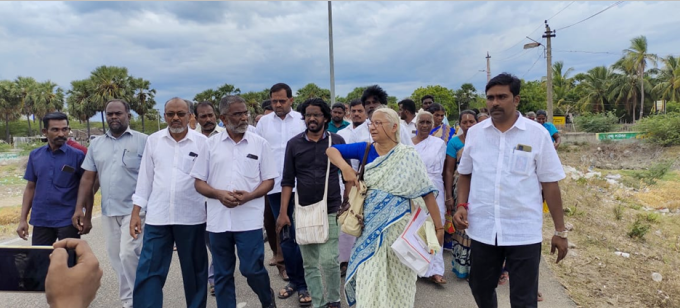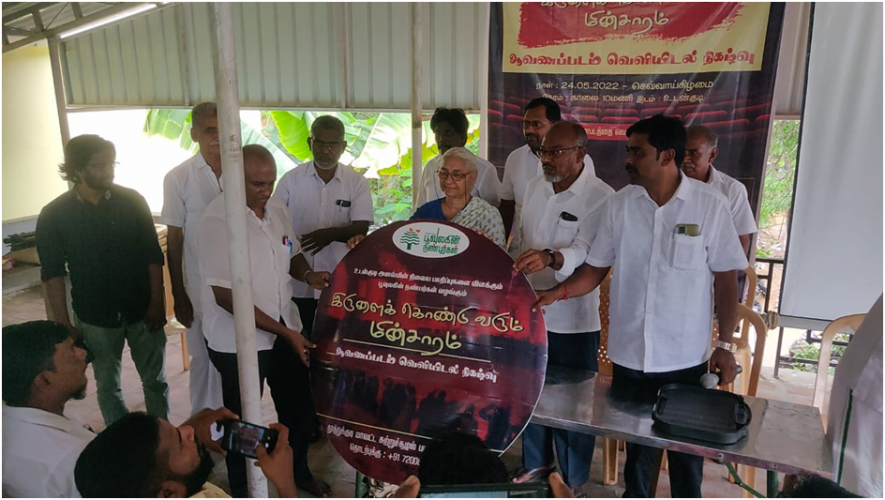TN: Udangudi Thermal Station a Threat to Environment, Livelihood of Fishermen, Activists Say

Medha Patkar and activists visiting the Udangudi TPS project site on May 26 (Image Courtesy: Prabhakaranan V)
The coal-powered, under construction Udangudi Supercritical Thermal Power Project in Tamil Nadu is threatening the environment, marine biodiversity and livelihood of the fishing and farming community.
The coal jetty constructed 8 kms inside the sea is a threat to the fishing community, while the subsequent possibility of seawater intrusion would affect the farming community.
Considering the imported coal requirement for the project, the subsequent higher cost of production and the history of severe pollution from different TPS in Tamil Nadu, the local people and environmental activists continue to demand the scrapping of the project. However, the completion of 40% of construction works in Phase 1.
Environmental activists question the need for more coal-powered TPS, while the installed capacity of the state is 33,500 MW against the peak demand hovering around 17,000 MW. Several countries have begun to abandon TPS and are moving towards renewable energy sources.
FISHERFOLK AND FARMERS SET TO LOSE LIVELIHOOD
The proposed project in Udangudi, a village in the Thoothukudi district in the state, lies close to the seashore. A number of fishing hamlets lie along with the project site, in which around 50,000 members make their living from fishing.
“The fishing community remains the most affected by the TPS in Tamil Nadu, with Mettur TPS being located inland,” said V Prabhakaran, a research scholar with Poovulagin Nanbargal, an environmental organisation which released a documentary on the possible impacts of Udangudi TPS recently.
The fishing community along 26 coastal villages has opposed the project since the announcement and has held protests against the coal jetty construction in 2018.
“The TPS in Tamil Nadu are known for polluting the environment and causing damage to marine biodiversity since three of the four major existing plants are close to the seashore. One more such plant, with huge capacity, could be dangerous for the environment and the people,” Prabhakaran said.
Stage 1 of the project would have 2*660 MW units, while the next two stages would add four more units with 660 MW capacities.
“The ongoing construction work itself has started polluting the groundwater. The used seawater has been redirected to farmlands resulting in damages to coconut and palm trees on around 4,000 acres. If the plants become functional, farmlands in around 10 kms would be affected,” Prabhakaran said.
The fisherfolk faces the threat of severe erosion due to the construction of the coal jetty and the possible dumping of fly ash, with North Chennai Thermal Power Plant (NCTPS) being an example.
The Kosasthalaiyar river, running close to NCTPS, is highly polluted, and thousands of fishing hamlets have lost their livelihood while polluting the northern part of Chennai.
POLLUTION REMAINS A MAJOR THREAT
The thrust for the renewable energy sector has been continuously increasing across the globe as global warming has become a major threat. The COP26 held in Glasgow has highlighted the threat from coal-powered thermal plants and the need to reach zero emissions.
“From a 500 MW coal-powered plant, 100 tons of Sulphur Dioxide (SO2), 24 tons of Nitric Oxide (NO), 2.5 tons of particulate matter and 3000 tons of fly ash would be generated. Six such plants are proposed in Udangudi, which will end up in massive emission of dangerous materials, affecting the public and the environment,” Prabhakaran said.
Responding to the allegation of major TPS violating the emission norms, Prabhakaran accused that the stations have violated the norms for 400 days in the last two years. “The emission has been 7 to 8 times higher than the prescribed conditions. People living closer to NCTPS have a history of higher illness and have reported 11,000 deaths due to pollution in Chennai,” he said.
The threat to marine biodiversity is another factor as the hot water discharge to the sea would be around 60-70% of the 17 crores litres used by the plants. The Udangudi region is close to the Mannar bio reserve and is known for the coral reef and grass, while the locality is also known for sea turtle breeding.
The Tamil Nadu Pollution Control Board (TNPCB) has proved inefficient in controlling emissions, both by government and private run entities, leading to air, water and land pollution in cities across Tamil Nadu.
Poovulagin Nanbargal has also flagged the usage of water bodies to construct the power plants. The site has been allegedly reclassified as ordinary land, while the maps and revenue records till 2003-04 have marked the site as a 'catchment area', a statement of the organisation said.
WHY NEED HIGHER INSTALLATION CAPACITY THAN DEMAND?
Another intriguing question is the push by successive state governments to install more generation capacity while the peak demand is almost half of the installed capacity.
Apart from the Udangudi TPS project, the state government has announced solar projects to the tune of Rs 70,000 crores for generating 22,000 MW.
Tamil Nadu has a generation capacity of around 32,000 MW as of April 2020, while the peak demand during 2022 was reported as 17,370 MW on March 29. Instead of utilising and increasing the efficiency of the existing power plants, which are normally operated at lower power factors, the government is announcing more coal-powered TPS.

Medha Patkar released the documentary produced by Poovulagin Nanbargal (Courtesy: Prabhakaran V)
“The government spending on TPS will only increase the financial liability of the state government. Electricity generation from solar could cost around Rs 3-4 while from this project would be around Rs 8 per unit. Further, the higher initial cost will also become a burden in addition to the impact on the environment and the people,” Prabhakaran said.
The project is expected to increase the financial liability of the Tamil Nadu Generation and Distribution Corporation (TANGEDCO) and Tamil Nadu Transmission Corporation (TANTRANSCO), the two entities which already contribute to the debt of the state.
The Poovulagin Nanbargal released a documentary on the possible impacts of the Udangudi thermal plant. Renowned social activist Medha Patkar visited the people residing closer to the project site and pledged support to their struggle.
“The different renewable energy projects will start generating electricity in another five years from now, implying that the generation from TPS would be over and above the requirement. The government of Tamil Nadu should act wisely and save money, people and the environment by abandoning such dangerous projects,” Prabhakaran said.
Get the latest reports & analysis with people's perspective on Protests, movements & deep analytical videos, discussions of the current affairs in your Telegram app. Subscribe to NewsClick's Telegram channel & get Real-Time updates on stories, as they get published on our website.
























